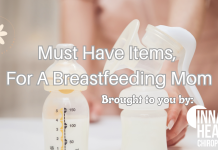 One topic that gets brought up often is the idea of weight loss during breastfeeding. Typically, in the context of if you found breastfeeding helped or hindered your baby weight loss efforts.
One topic that gets brought up often is the idea of weight loss during breastfeeding. Typically, in the context of if you found breastfeeding helped or hindered your baby weight loss efforts.
Before we dive into the science behind these ideas, I want to clarify something quickly. The idea of weight loss from baby weight, or any weight gain, is something that you yourself should decide if it is best for you and where you are currently at in your season of motherhood. Never make that decision based on a feeling of necessity or societal expectations. EVER!
Now that we have that sorted out, let’s dive into the do’s, don’ts, and where we may be struggling with results.
Is it Ok to Diet When Breastfeeding?
When it comes to establishing milk supply, it is recommended to NOT try to diet or purposefully lose weight in the first 2 months. This gives your body enough time to successfully establish a healthy milk supply that is less likely to be adversely affected if your caloric intake is restricted.
Along with the idea of the first 2 months being an important time to establish milk supply, it is also a period where hormones are still trying to adjust and sleep is at its worst. Not optimal dieting environments for women.
So what is needed to lose weight safely after the 2-month mark?
Generally, in fitness, to lose weight or body fat, you must be in a negative caloric balance while still fueling lean mass.
However, this needs to be done in a safe and smart manner during not just breastfeeding, but ANY TIME.
The Do’s of safe dieting during lactation
1. Breastfeeding your baby, on average, burns 200-500 calories per day. So keep in mind that even without a weight loss program you are burning extra calories.
2. Breastfeed often and as long as possible. Research has shown past six months increases maternal weight loss.
3. Eat at least 1500-1800 calories per day. Meaning, don’t try to crash diet. Too often, women tend to go to the far end of calorie restriction and we naturally slow our metabolism. The body adapts to a lessened calorie requirement.
4. Focus on whole, nutrient-dense foods. These foods tend to be harder to “overdo” and naturally keep calories in check. This focus also keeps nutrients high to provide the best we can for our bodies and baby.
5. Stay active. Small walks, playing with older kids, etc will add small calorie bumps to your day without having to restrict food.
6. Sprinkle in strength training. The more lean mass we have the more calories we burn.
Now that we have established some do’s…
The Don’ts of dieting during lactation:
1. Don’t crash diet. Too rapid of a drop in calories can hinder milk supply. You may notice this if you’ve experienced a sickness where you can’t eat for some time. In most instances, too rapid weight loss will not hurt overall milk supply but hinder the mother’s nutrition and wellbeing.
2. Don’t aim for more than 1-1.5lbs a week of a loss
3. Don’t eliminate entire food categories unless medically needed. Some instances we need to if there is evidence of food sensitivities in baby. Going too low by cutting carbs all together or too low in fats can hinder milk production, but more importantly your health.
Why we may struggle to lose while breastfeeding:
1. We’ve overestimated how much extra food we really need. We tend to eat that extra 200-500 on top of our maintenance needs. A good rule of thumb, if you were eating slightly higher to support pregnancy, that increase was already there to then support a nursing baby. We can maintain our pregnancy intake requirements or slightly less if we gained slightly more than recommended.
2. Our hormones. Dang it! Rest and recovery are important to lower cortisol. Depending on baby’s sleep and other children’s needs: you may need more rest.
3. Our activity has changed. The adjustment to a new baby, new responsibilities, and maybe going back to work may leave momma with less time to hit the gym. Pre-baby you didn’t mind that extra time after a long day’s work. Now you want to rush home to the little one. I don’t blame you! This however does change what will happen to our bodies. (Reminder: that’s ok).
4. The extent of breastfeeding: Is your child exclusively breastfed, mostly breastfed, or breastfed 1-2 times per day? Calorie requirements would be proportionally less if feedings are less.
5. Mom’s fat reserves: Is your BMI low, high, or in-between? A mom who does not have any spare fat reserves will need the greatest number of extra calories. Maternal fat stores typically provide about 200 calories per day towards lactation, so if your BMI is low (particularly if you’re considered very underweight, or BMI<19.8) you will need to get extra calories from your diet.
Take Away
Yes, you can successfully lose weight and body fat while breastfeeding. You can maintain your supply and keep yourself healthy and baby healthy.
Some of us will have an easier time than others. Factors outside of our intake will affect outcomes. However, if we take a smart and slow approach we can ultimately see the changes we are after.
Give yourself grace, give yourself time, and always make sure your decision is for YOU and benefits you and your family.













